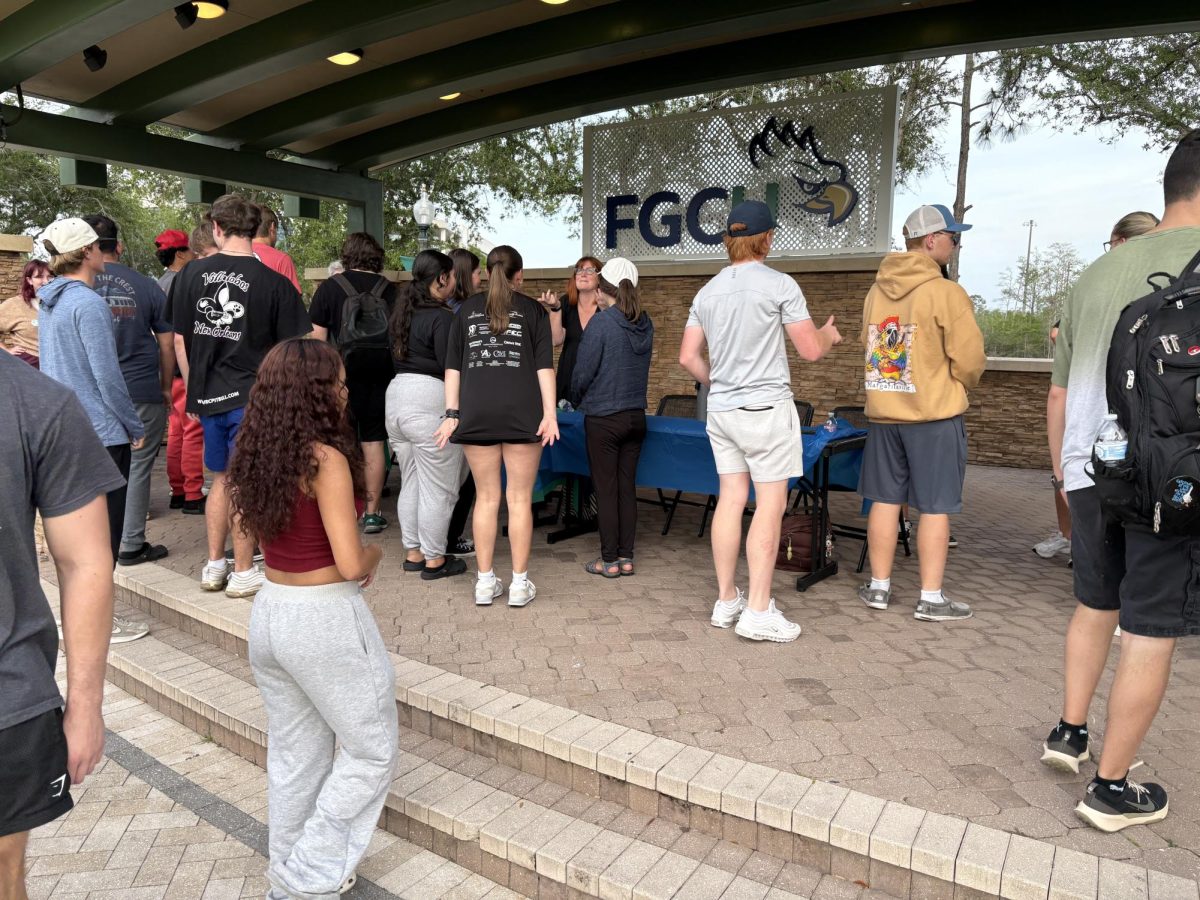Letter in reference to Jan. 2 Eagle News article “Going to the beach in January” by Iman Zekri
Dear Editor:
It is a mistake for Iman Zekri to make a link between extreme weather and global warming.
This is one of the few areas of agreement between the United Nations Intergovernmental Panel on Climate Change (IPCC) and the Nongovernmental International Panel on Climate Change (NIPCC).
In 2012, the IPCC asserted that a relationship between global warming and wildfires, rainfall, storms, hurricanes and other extreme weather events has not been demonstrated.
In 2013, the NIPCC concluded the same, saying, “In no case has a convincing relationship been established between warming over the past 100 years and increases in any of these extreme events.”
The National Climate Data Center reveals that extreme weather state records for Florida are spread throughout the past century, with no recent increase.
Here are some of the records:
Maximum Temperature: 109 F, 1931
Minimum Temperature: – 2 F, 1899
Maximum 24-Hour Precipitation: 23 in., 1980
Maximum 24-hour Snowfall: 4 in., 1954
Maximum Snow Depth: 4 in., 1954
Yet, on the false premise that there has been a supposed increase in extreme weather events caused by global warming, President Obama wants to end America’s use of coal, your country’s least expensive and more plentiful power source. Florida gets 21 percent of its electricity from coal. In fact, Florida families living below the poverty line spend 68 percent of their income on energy. It is worrisome for us here in Canada, and indeed across the free world, when our primary defender is bent on crippling itself in this way.
Sincerely,
Tom Harris, B. Eng., M. Eng. (Mech.)
Executive Director
International Climate Science Coalition (ICSC)





























Don • Jan 16, 2016 at 10:10 pm
http://www.dailykos.com/story/2015/5/12/1384339/-Facing-the-Facts-and-Fictions-of-the-Climate-Change-Deniers
Leslie Graham • Jan 9, 2016 at 9:44 pm
“Much of the country had warmer than average minimum temperatures, with the largest departures from average across the West. Eights states were record warm”
https://www.ncdc.noaa.gov/sotc/national/201510
And so on and so on.
Stop tellin glies for the fossil fuel lobby. Everyone is on to you since Exxon and others have been exposed in the mainstream media these last few weeks.
Leslie Graham • Jan 9, 2016 at 9:41 pm
“2015 Has Been A Year Of Record-Breaking U.S. Weather Events”
Multiple states have broken heat records as 2015 shapes up to be the hottest year on record. Florida recorded its hottest March to May, while California — seen above with tourists in Death Valley this summer — Idaho, Oregon, Utah and Washington all logged their hottest Junes.
http://www.huffingtonpost.com/entry/record-breaking-weather-events_5612d0e8e4b0dd85030ce995
Leslie Graham • Jan 9, 2016 at 9:39 pm
June 2015 Smashes Heat, Rainfall Records Across the U.S.
Wet
Baltimore, Maryland (BWI Airport): Record wettest June (13.09 inches) and fourth wettest calendar month.
Corpus Christi, Texas: Wettest year-to-date (31.89 inches); previous record was 28.35 inches in 1993.
Fort Wayne, Indiana: Record wettest month (11.98 inches); previous record wet month was 11.00 inches in July 1986.
Grapevine Lake, Texas: Record water level around June 20 after rainfall from Tropical Storm Bill; this exceeded the lake level following May’s record rain.
Hastings, Nebraska: Wettest June calendar day on record (4.74 inches on June 4).
Illinois: Record wettest June statewide, topping the previous record from 1902; also the second wettest month all-time, behind only September 1926
James River near Springfield, Missouri: Record crest (22.2 feet) on June 16, just over 2 inches above the previous 1909 record.
Lima, Ohio: Record wet June (12.67 inches); also the wettest single month in records dating to 1901
Millville, New Jersey: Record wet June (12.74 inches); tied with August 2011 for the second wettest month behind 12.90 inches in July 1969.
Montpelier-Barre, Vermont: Record wet June (9.05 inches); previous record wet June (8.36 inches) was in 2013.
Mt. Mansfield, Vermont: Record wet June (15.54 inches); previous wettest June (15.28 inches) was in 1998.
Oklahoma City: Record wettest year-to-date (34.43 inches); average January-June precipitation is 18.68 inches.
Phoenix: First measurable rain on record for June 5 (0.16 inches); average June rainfall is 0.02 inches.
Port Huron, Michigan: Record wet June (7.86 inches); previous record (7.46 inches) was in 1962.
Rapid City, South Dakota: Record wet June (7.12 inches); previous record (7.00 inches) was in 1968.
Red River near Gainesville, Texas: Record crest on June 19 (42.05 feet) topped the previous record from May 31, 1987 by almost 2 feet.
St. Louis: Record wet June (13.14 inches); previous record (12.35 inches) was in 2003; second wettest month behind August 1946 (14.78 inches)
Van Wert, Ohio: Record wet June (14.72 inches); also the wettest single month in records dating to 1893
Warren, Ohio: Record wet June (13.27 inches); previous record (10.78 inches) was in 1896
Washita River near Dickson, Oklahoma: Record crest (48.7 feet) on June 19.
Wauseon, Ohio: Record wet June (9.06 inches); previous record (7.92 inches) was in 1981
Hot
Barrow, Alaska: Record warmest June; previous record was in 2013; followed a record warm May
Bishop, California: Tied record hottest June with 1960; 17 days in 100s a record for June, topping 14 such days in 1961.
Boise, Idaho: Record hottest June; previous record was in 1918.
Burns, Oregon: Record hottest June; previous record was in 1961.
Charlotte, North Carolina: Record number of June 100-degree-plus days (6); previous record (3 days) was in 1959 and 1952. Also, the earliest in the calendar to have three straight 100-degree-plus days.
Ely, Nevada: Record hottest June; previous record was in 1900
Eugene, Oregon: Record hottest June; previous record was in 1926.
Helena, Montana: Record hottest June; previous record was in 1961.
Kalispell, Montana: Record hottest June; previous record was in 1898.
Kingman, Arizona: Tied record number of June 100-degree-plus days (15) with 1981, 1936 and 1915.
Las Vegas: Record hottest June; previous record was in 2013.
Lewiston, Idaho: Record hottest June; previous record was in 1940.
Medford, Oregon: Record hottest June; previous record was in 1926.
Miami: Record hottest year-to-date (January-June), according to the Southeast Regional Climate Center; previous hottest January-July was 2008.
Missoula, Montana: Record hottest June; previous record was in 1903.
Moses Lake, Washington: Record hottest June; previous record was in 1958.
Olympia, Washington: Record hottest June; previous record was in 1969.
Orlando Utilities Commission: All-time peak power use record on June 22.
Pendleton, Oregon: Record hottest June; previous record was in 1961.
Portland, Oregon: Record hottest June; previous record was in 1992.
Provo, Utah: Record hottest June; previous record was in 1994.
Raleigh, North Carolina: Record streak of 95-degree-plus highs (12 straight days) from June 13-24; previous record (9 straight days) was from July 13-21, 1977.
Reno, Nevada: Record hottest June; previous record was in 2006.
Salem, Oregon: Record hottest June; previous record was in 1926.
Salt Lake City: Record hottest June; previous record was in 1988.
Seattle: Record hottest June; previous record was in 1992; also the record warmest January-June.
Spokane, Washington: Record hottest June; previous record was in 1922.
The Dalles, Oregon: Record hottest June; previous record was in 1977.
Walla Walla, Washington: Record hottest June; previous record was in 1992.
Wenatchee, Washington: Record hottest June; previous record was in 1992.
Winnemucca, Nevada: Record hottest June; previous record was in 1918.
Yakima, Washington: Record hottest June; previous record was in 1948.
(MORE: All June Calendar-Day, All-time Northwest Heat Records | Spain’s Record Heat)
Dry
Great Falls, Montana: Record driest June (0.44 inches); previous record was 0.52 inches in 1960.
Portland, Oregon: Longest June dry streak: 24 days without measurable rainfall June 4-27.
Quillayute, Washington: Record driest June (0.20 inches); previous record was 0.40 inches in 1967.
San Francisco (downtown): Record driest year-to-date (3.10 inches); previous record was 3.51 inches in 2013; average January-June precipitation is 14.54 inches.
(MORE: Alaska’s June Wildfires)
Cold
Boston: Record cold daily high for June – 49 degrees – set two days in a row on June 1 and 2. This was 6 degrees colder than the daily average low, and is an average high for March 29 or Nov. 22.
http://www.weather.com/news/news/june-records-heat-rain-2015
Leslie Graham • Jan 9, 2016 at 9:35 pm
By the way Tom. 2015 is, GLOBALLY, the hottest year on record by a huge margin. Every data set we have confirms this.
And your claim above is simply a flat out lie. Why do it? why tell such obvious lies that can be disproved in sencoeds? Just weird really.
“More Than 5,900 Daily Records Broken as Pre-Christmas Warm Wave Engulfs East, Midwest, South”
http://www.weather.com/forecast/national/news/warm-united-states-december-2015
Leslie Graham • Jan 9, 2016 at 9:32 pm
Wow.
Now that man made climate change is an obvious everyday reality all over the world the last of the deniers just sound insane.
No intelligent person is denying it any longer – the world has moved on.
Hopsgegangen • Jan 9, 2016 at 1:57 pm
NIPCC is just a front for fossil fuel interests.
Tom Harris • Jan 8, 2016 at 1:35 pm
Florida is just an example. The National Oceanic and Atmospheric Administration state records for extreme weather ( http://www.ncdc.noaa.gov/extremes/scec/records ) shows that, of the 347 state records set (maximum temperature, minimum temperature, max rainfall, min rainfall, etc.) between 1893 and the present across the US (the best part of the world record), NONE occurred in 2015.
Only one occurred in each of 2014, 2013 and 2012.
Clearly, on a state-wide basis, there is no increase in extreme weather records.
Ben Bass • Jan 8, 2016 at 1:23 pm
Tom, Since when is Florida a synonym for the world? Looking out the window or checking the local weather station isn’t giving anyone any measure for the globe as a whole. I don’t know how you could possibly have missed that with your stated Mech. Eng. background.